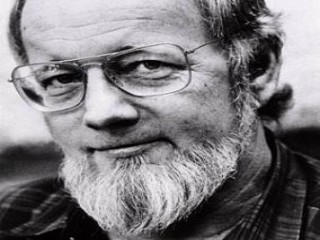
Donald Barthelme biography
Date of birth : 1931-04-07
Date of death : 1989-07-23
Birthplace : Philadelphia, Pennsylvania
Nationality : American
Category : Famous Figures
Last modified : 2011-05-23
Credited as : Author, co-founder of Fiction, Come Back, Dr. Caligari
55 votes so far
In 1961, Barthelme became director of the Contemporary Arts Museum in Houston; he published his first short story the same year. His New Yorker publication, "L'Lapse," a parody of Michelangelo Antonioni's film L'Eclisse [The Eclipse], followed in 1963. The magazine would go on to publish much of Barthelme's early output, including such now famous stories as "Me and Miss Mandible," the tale of a thirty-five-year-old sent to elementary school by either a clerical error or failing at his job as an insurance adjuster and failing in his marriage, and "A Shower of Gold," in which a sculptor agrees to appear on the existentialist game show Who Am I?. Barthelme collected his early stories the following year in Come Back, Dr. Caligari, for which he received considerable critical acclaim as an innovator of the short story form. His style (fictional and popular figures in absurd situations, e.g., the Batman-inspired "The Joker's Greatest Triumph"), spawned a number of imitators and would help to define the next several decades of short fiction.
Barthelme continued his success in the short story form with Unspeakable Practices, Unnatural Acts (1968). One widely anthologized story from this collection, "The Balloon," appears to reflect on Barthelme's own intentions as an artist. The narrator of the tale inflates a giant, irregular balloon over most of Manhattan, causing widely divergent reactions in the populace. Children play across its top, enjoying it quite literally on a surface level; adults attempt to read meaning into it, but are baffled by its ever-changing shape; the authorities attempt to destroy it, but fail. Only in the final paragraph does the reader learn that the narrator has inflated the balloon for purely personal reasons, and sees no intrinsic meaning in the balloon itself, a metaphor for the amorphous, uncertain nature of Barthelme's fiction. Other notable stories from this collection include "The Indian Uprising," a mad collage of a Comanche attack on a modern city, and "Robert Kennedy Saved From Drowning," a series of vignettes showing the difficulties of truly knowing a public figure; the latter story appeared in print only two months before the real Kennedy's 1968 assassination.
Barthelme would go on to write over a hundred more short stories, first collected in City Life (1970), Sadness (1972), Amateurs (1976), Great Days (1979), and Overnight to Many Distant Cities (1983). Many of these stories were later reprinted and slightly revised for the collections Sixty Stories (1981), Forty Stories (1987) and, posthumously, Flying to America (2007). Though primarily known for these stories, Barthelme also produced four novels characterized by the same fragmentary style: Snow White (1967), The Dead Father (1975), Paradise (1986), and The King (1990, posthumous).
Barthelme also wrote the non-fiction Guilty Pleasures (1974). His other writings have been posthumously gathered into two collections, The Teachings of Don B.: Satires, Parodies, Fables, Illustrated Stories, and Plays of Donald Barthelme (1992), and Not-Knowing: The Essays and Interviews (1997). With his daughter, he wrote the children's book The Slightly Irregular Fire Engine, which received the National Book Award for Children's Literature in 1972. He was also a director of PEN and the Author's Guild, and a member of the American Academy and Institute of Arts and Letters.
Author of books:
Come Back, Dr. Caligari (1964, short stories)
Snow White (1967, novel)
City Life (1970, short stories)
The Slightly Irregular Fire Engine or the Hithering Thithering Djinn (1971, juvenile)
Sadness (1972, short stories)
The Dead Father (1975, novel)
Sixty Stories (1981, short stories)
Overnight to Many Distant Cities (1983, short stories)
Paradise (1986, novel)
The King (1990, novel)
















